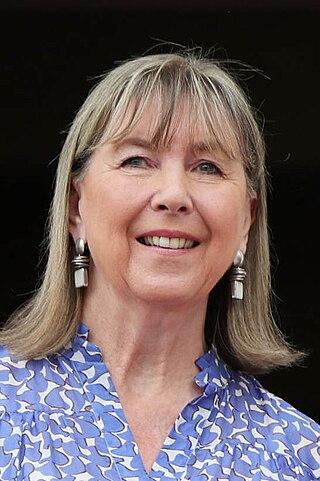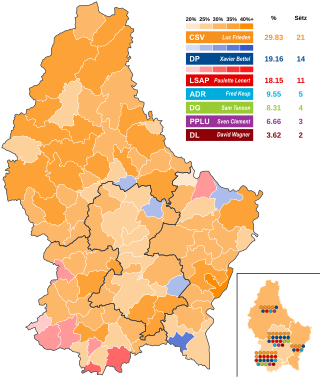
The history of Luxembourg consists of the history of the country of Luxembourg and its geographical area.
Luxembourg is a parliamentary representative democratic monarchy, whereby the prime minister is the head of government, and the multi-party system. Executive power is under the constitution of 1868, as amended, exercised by the government, by the grand duke and the Council of Government (cabinet), which consists of a prime minister and several other ministers. Usually, the prime minister is the leader of the political party or coalition of parties having the most seats in parliament. Legislative power is vested in both the government and parliament. The judiciary is independent of the executive and the legislature.

The Luxembourg Socialist Workers' Party, abbreviated to LSAP or POSL, is a social democratic, pro-European political party in Luxembourg. The LSAP sits on the centre-left of the political spectrum.

The Greens is a green political party in Luxembourg.

Lydie Polfer is a Luxembourgish politician who has served in a number of capacities, including Deputy Prime Minister, Minister for Foreign Affairs, and Mayor of Luxembourg City, as well as a Member of the European Parliament (MEP) and a member of the Chamber of Deputies. She is a member of the Democratic Party (DP).

Luxembourg has participated in the Eurovision Song Contest 38 times since its debut at the first contest in 1956. The Luxembourgish national broadcaster, RTL Lëtzebuerg (RTL), participates in the contest representing the country. The nation participated in all but one event between 1956 and 1993, only missing the 1959 contest. After finishing among the bottom seven countries in 1993, Luxembourg was relegated and prevented from competing in 1994. The nation declined to return to the contest in 1995, and would make no further appearances over the next three decades. The country returned to the event for the first time in 31 years in 2024.
Elections in Luxembourg are held to determine the political composition of the representative institutions of the Grand Duchy of Luxembourg. Luxembourg is a liberal representative democracy, with universal suffrage guaranteed under its constitution. Elections are held regularly, and are considered to be fair and free.

The Communist Party of Luxembourg is a communist party in Luxembourg. Ali Ruckert is the current chairman of the party.

The Alternative Democratic Reform Party is a conservative and mildly populist political party in Luxembourg. It has five seats in the sixty-seat Chamber of Deputies, making it the fourth-largest party. In 2024, the party received its first seat in the European Parliament.

Claude Wiseler is a Luxembourgish politician, serving as the current and 40th President of the Luxembourg Chamber of Deputies since 21 November 2023 and who served as President of the Christian Social People's Party (CSV) from 2021 to 2023.

The Chamber of Deputies, abbreviated to the Chamber, is the unicameral national legislature of Luxembourg. The metonym Krautmaart is sometimes used for the Chamber, after the square on which the Hôtel de la Chambre is located.
The Party of the Third Age was a political party in Luxembourg. It contested the 1999 election to the Chamber of Deputies, but has since disbanded.

From August 1914 until the end of World War I on 11 November 1918, the Grand Duchy of Luxembourg was under full occupation by the German Empire. The German government justified the occupation by citing the need to support their armies in neighbouring France, although many Luxembourgers, past and present, have interpreted German actions otherwise.

The first Juncker–Asselborn Government was the government of Luxembourg between 31 July 2004 and 23 July 2009. It was led by, and named after, Prime Minister Jean-Claude Juncker and Deputy Prime Minister Jean Asselborn.

The Juncker–Polfer Government was the government of Luxembourg between 7 August 1999 and 31 July 2004. It was led by, and named after, Prime Minister Jean-Claude Juncker and Deputy Prime Minister Lydie Polfer.

The Werner-Thorn Government was the government of Luxembourg between 16 July 1979 and 20 July 1984.

The Werner-Cravatte Government was the government of Luxembourg between 15 July 1964 and 6 February 1969. Throughout its term, the Deputy Prime Minister was Henry Cravatte, replacing Eugène Schaus, who had been Deputy Prime Minister in the first Werner-Schaus Government. It was a coalition between the Christian Social People's Party (CSV), and the Luxembourg Socialist Workers' Party (LSAP).

The Reuter Ministry was the government in office in Luxembourg from 28 September 1918 until 20 March 1925, headed by Émile Reuter. It resulted from the Chamber elections of 28 July and 4 August 1918 and was reshuffled on 5 January 1920 as a result of the elections of 26 October 1919. There was a further reshuffle on 15 April 1921, when the Liberals left the government.
The Left Bloc was a political alliance in the Chamber of Deputies of Luxembourg at the beginning of the 20th century. The "marriage of convenience" between the Social Democratic Party and the Liberal League was formed in 1908.

General elections were held in Luxembourg on 8 October 2023 to elect all 60 seats of the Chamber of Deputies.















